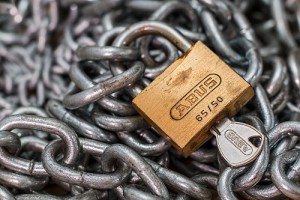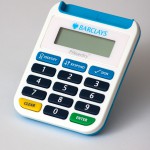In the past, information about your bank transactions, credit card transactions, investment statements, and other financial paperwork came through paper documents. People were told to keep these documents safe or shred them when they were not longer needed. Today, the majority of our financial records can be accessed online. Apart from a few paper records, everything you need to know can be accessed from nearly anywhere in the world, instantly.
While online access definitely makes our record keeping simpler and eliminates a paper trail, we now need to ensure that we are the only ones who can access our online financial records. Fraud and identity theft are growing problems, impacting millions of people each year. Here are some basic steps you should follow to avoid becoming a victim.
Keeping Your Information Safe
When it comes to your unique identification (your birthdate, your social security number, your bank account numbers, your passwords, etc.), be aware that scammers would like to get that information in order to take advantage of you and others. You might tell yourself that you’ll never give out that information, but when someone calls from the IRS asking you to confirm your social security number, you may do it without thinking. After all, isn’t the IRS a trustworthy organization? The answer is Yes, but fraudsters pretend to work for the IRS and other trusted organizations just to get personal information from people like you. Giving your personal information to someone unwittingly is the biggest ways people give up their information to identity thieves and other fraudsters. There are a few best-practices you can use to make sure your information stays safe.
Never, Ever Give Out Your Password

Never give out your password. This may seem obvious, but it remains the most common way that you allow someone access to your account. An agent of a financial institution will never ask for your password. Employees whose job responsibilities include helping customers can access your accounts using their own administration tools. Some companies will ask you to set up security questions to reset your own password if you forget what you chose. Other companies will ask you to choose a PIN number so that if you need help with your accounts, the PIN acts as another layer of security.
Create different passwords for your accounts. Never use the password to your banking information on a website where you shop. Some websites let their staff see your password or they store your password in such a way that it can be decoded easily. In the past five years, the news has reported stories of retailers or websites that were “hacked.” This means that someone got unauthorized access to the website information, often including customer account information. The hackers can then use the customers’ personal information in illegal ways. Since people often use the same email address or username for different online accounts, hackers who have stolen your personal data will try the same username and password combination they stole from one site to get access to other sites.
The best approach includes creating unique passwords for each of your accounts and updating your passwords every few months.
Keep Your Credit Card Number Safe!
“Hello, this is Jameson calling from Visa. Would you mind verifying your credit card number for me?” Identity thieves often call and claim to be from the IRS, the electric company, or a local business who claims you just won a prize. Why? Because these are organizations you trust and they are hoping you’ll let your guard down and give them your credit card number.
This type of fraud also happens online through emails where you are asked to click a link and verify your information for your bank account, your Paypal account, your Apple account, etc. These emails often ask for personal information in an effort to steal your login credentials or card information. The links may even look very realistic.
Just remember, if you weren’t the individual who initiated the phone call or the email, don’t give out your credit card number. In all cases, call your financial institution to verify that they needed to reach you, or in the case of an email, report it as spam.
Other Security Measures

Most financial institutions and other retailers, such as T-Mobile, now have multiply layers of security in place to protect you and your accounts. If you try to reach your online bank account and you are using a device that the bank’s server doesn’t recognize, such as a new computer or a computer at the hotel you are visiting, the bank will want to verify that you, the account holder, is truly the one trying to access the account. The bank will send you a temporary PIN number via text, a phone call, or an email, and you will need to enter that information online in order to complete your login process.
Most credit cards now include a chip and a CVV code. The chip means that when you use your card at a retailer, your account information is scrambled, making it harder for the information to be stolen. The CVV code (card verification value) protects your card number from being used in online transactions unless that code is also provided.
One security measure you need to be aware of is the way you share personal information on social networking sites. If you post too much information about yourself, an identity thief can “uncover” key pieces of information about your life and use it to answer the “challenge questions” on your accounts.
Who CAN You Share Your Information With?
In the normal course of doing business, a company may ask for personal information about you. After all, your personal information is what makes you unique, so that is an easy way for a company to create a unique customer database. But there are only a few situations where you need to provide this data about yourself. Your employer will need your personal information for wage and tax purposes. A business may ask for your social security number in order to check your credit before giving you a loan, renting you an apartment, or making a job offer. However, most institutions do not need your social security number at all. If they ask for it, ask if they can provide you with a unique customer number instead.
The decision to share your key personal information is yours to make. Ask questions before deciding to share it. Ask why they need that information, how it will be used, how they will protect it, and what happens if you decide not to share. After all, it’s your identity at stake.
What To Do When Disposing Of Your Devices

Computers, smartphones, and cameras allow you to keep a great deal of information at your fingertips, but when you dispose of, donate, or recycle a device you may inadvertently disclose sensitive information, which could be exploited by cyber criminals. The Department of Homeland Security Office of Cybersecurity and Infrastructure offers the following recommendations:
- For your Smartphone or Tablet, perform a hard reset. This returns the device to its original factory settings
- For your digital camera, gaming console, or media players, perform a factory reset and remove the memory cards from the systems.
- For your computer, you have a few options. Do a secure erase or wipe the hard drive using built-in or for-purchase software programs. This will remove or erase sensitive information. Physical destruction of your computer is the ultimate way to prevent others from retrieving your personal information. You can pay to have a specialized service melt or pulverize your hard drive, or you can destroy it yourself by driving nails or drilling holes in it.
Whatever method you choose, just remember that your goal is to keep your personal information safe so that your accounts are not compromised, leading to potential theft or fraud.

Get PersonalFinanceLab
This lesson is part of the PersonalFinanceLab curriculum library. Schools with a PersonalFinanceLab.com site license can get this lesson, plus our full library of 300 others, along with our budgeting game, stock game, and automatically-graded assessments for their classroom - complete with LMS integration and rostering support!
Learn More[qsm quiz=73]
Challenge Questions
- Why are your personal details valuable to hackers?
- How can you be effected when your private information gets into the wrong hands?
- Have you or anyone you know ever been a victim of fraud. If so, explain how it could have been prevented.
- Give three pieces of advice that you would pass onto someone younger than you, on how you can protect yourself against fraud and scammers.
